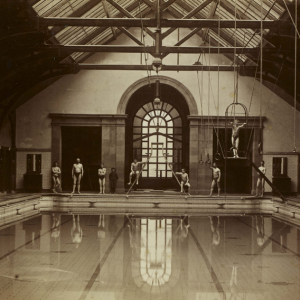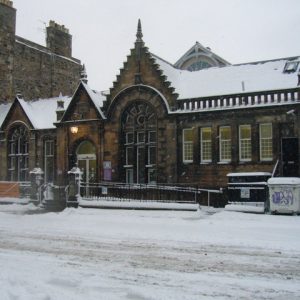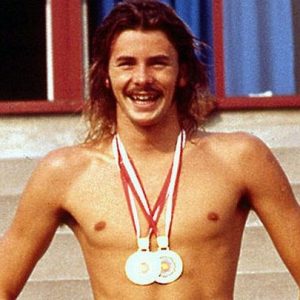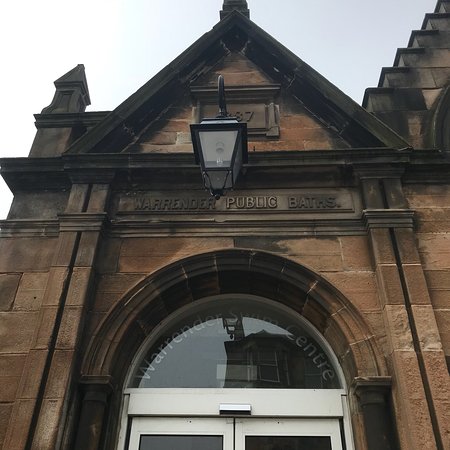1888 – 1914 – The early years
The history of Warrender Baths Club started in 1886 when a few members of the Bellahouston Private Baths Club in Glasgow decided, with some Edinburgh friends, to build a private swimming baths in Edinburgh. Frank Y. Henderson formed the Warrender Private Baths Company Limited that purchased a piece of ground from Sir George Warrender, MP, of Bruntsfield House. The Baths, designed by Robert Paterson, a local architect, were erected and equipped at a cost of £11,000 and opened on Saturday 17th December 1887 by Sir George Warrender. The first recorded Baths Champion was George M. Paterson in 1892. He was also the first President of the Club in 1894 and secretary of the Scottish Amateur Swimming Association the following year. In 1904 the Club Colours of light blue, dark blue and scarlet were adopted. At this time however there was a great financial depression and the Baths closed early in 1906 due to lack of support. At the AGM of the Club it was agreed to carry on the Club in other headquarters. In 1908 Edinburgh Corporation purchased the Baths and its equipment for £3000 and in May of that year Warrender Baths Club was reformed at its original home. The club continued to perform strongly until the Great War in 1914 when formal club activities ceased with every senior member of Warrender Baths Club joining the Forces.

1919 – 1945 – The club grows
The club reformed in May 1919 and immediately returned to a position of strength when they again won the Scottish Championships. By 1924 Warrender had its first Olympic representative, Ellen King, for the 100 yards backstroke at Paris where she finished sixth. Ellen King was the club’s greatest swimmer to that date and was the only swimmer to have won three British Championships at different strokes. Ellen left the club in 1925 and her position as Warrender’s outstanding lady swimmer was taken by Jean McDowall who swam for Great Britain in the 1928 Amsterdam Olympics, finishing fourth in the 100m freestyle. By 1932 the club was totally dominant in Scottish swimming, winning the Ladies Team Race Championship, the Men’s team Race Championship and the Scottish Water Polo Championship, breaking all records. The club maintained this dominance through to its jubilee year in 1938 when it again won the East of Scotland Team Race title which it had held every year apart from two since 1914. The outbreak of the Second World War in 1939 again suspended the clubs’ activities until 1945, with the exception of two Galas held in 1942 and 1943 for charity.
1946 – 1967 – Rebuilding the club
When the post-war committee of the Club met in 1946 they were faced with the daunting task of rebuilding the Club virtually from scratch. It took several years to re-establish the club’s swimming prowess, but by 1950 the Warrender junior team was the best in the East District, and in 1951 the Club regained the East District Team Race Championship for the first time since 1938. The club continued to develop its strength, and in 1958 Jim Hill, Ian Percy-Robb, Val Marrian and Bill Law represented Scotland in the British Empire Games at Cardiff .The club continued to grow in the 1960’s, increasing both the depth of its swimmers and the extent of the training facilities used. In the spring of 1966 Warrender had its first visit from an overseas club Darmstadt, an association that was to flourish and last many years.

1968 – 1976 – The David Wilkie Years
The period from 1968 to 1976 was undoubtedly the most successful period in the clubs history. The club dominated Scottish swimming and was a major force in British swimming with swimmers consistently competing and winning in European, Commonwealth and World arenas. The most prominent swimmer was David Wilkie, but he was joined by a number of other swimmers who also won medals in international competition. Much of this success was a direct result of the driving force of Club President Frank Thomas who devoted an enormous amount of time to the Club. In 1970 no fewer than ten Warrender swimmers represented Scotland in the Commonwealth Games with David Wilkie and Sally Hogg representing Great Britain in the European Games in Barcelona later that year. David Wilkie was awarded the Nancy Riach Memorial Medal Award and the W.G.Todd Cup and Prize by the SASA for outstanding achievement in swimming. This was the first time in the Association’s history that both awards had gone to the same person in the same year, the latter award being for the outstanding junior swimmer of the year.

Warrender were dominating Scottish and perhaps even British swimming. John Ashton was Chief Coach and helped build a club structure with a strong base for the future. At the 1972 Olympic Games in Munich, David Wilkie set a new European record when winning the Silver medal in the 200 Breaststroke. In 1973, at the World Championships in Belgrade, Wilkie struck Gold in the 200 Breaststroke and won Bronze in the 200 I.M., both were Commonwealth records. The 1974 Commonwealth Games in Christchurch saw Wilkie win two Gold medals in 200 Breaststroke and 200 I.M. plus Silver in the 100 Breaststroke. Kim Wickham won Silver in the 100 Butterfly and was joined by Morag McGlashan winning Bronze in the 4 x100 Medley Relay. Gordon Hewitt, Wickham and Wilkie represented also at the European Championships in Vienna where Wilkie won Gold in the 200 Breaststroke and broke the world record in winning the 200 I.M. in 2:06.32. David Wilkie was presented with his Life Membership of Warrender on his arrival home to Edinburgh. In 1975 three Warrender swimmers represented at the World Championships in Cali, Columbia. Alan McClatchey and Gordon Downie broke three Scottish records between them and David Wilkie again broke the European record in winning the 200 Breaststroke in 2:18.23 and 100 Breaststroke in 1:04.26. McClatchey and Downie won a Silver medal each in the 4 x 200 Freestyle Relay team and Wilkie and Downie also won a Bronze in the 4 x 100 Medley team.
In 1976 at the Olympic Games in Montreal came the finest moment for Warrender and David Wilkie. The British public still remember David as ‘Scotland’s greatest ever swimmer. He won the Gold medal in the 200 Breaststroke in a new World Record of 2:15.11 and also Silver in the 100 Breaststroke in a European record of 1:03.43. Gordon Downie and Alan McClatchey also won Bronze medals in Montreal as part of the 4 x 200 Freestyle team. On returning home over 300 Warrender members attended a reception for our Olympic Champion. After a speech by Club president, Mae Cochrane, David paid tribute to Frank Thomas and John Ashton for their contributions to his success. David was voted European Male Swimmer of the Year and was also awarded the MBE.
1977 – 1987
Late in 1978 Warrender took the decision to appoint a full time professional Coach, the first ever in and early in 1979, Ian Curry was appointed to the post.
In 1982, Mae Cochrane was awarded the OBE for her outstanding services to swimming.
Paul Easter represented Great Britain in the European Cup in Gothenburg and then Scotland in the Commonwealth Games in Brisbane, Australia where he won Bronze medal in the 4 x 200 Freestyle Relay and the 4 x 100 Medley Relay. He also represented Great Britain in the World Championship in 1982. At the 1984 Olympic Games in Los Angeles Paul swam a magnificent anchor leg in the 4 x 200 Freestyle Relay to snatch the Bronze medal for Great Britain. Warrender continued to have success in the pool with Paul Easter, Colin Bole and Andrew Smith earning places in the 1986 Scottish Commonwealth Games team. In 1987 Warrender won both the Robertson and the Waldie Trophies, the first time that a club had won both the National Open Championship and the National Age Group Championships in the same season.
The appointment of a group of new coaches in 1984 saw the introduction of a new system of administration to cope with the Club’s development. The club could no longer proceed efficiently through the executive committee. A swimming committee made up of Club coaches and the swimming convenor was established and along with an organisation committee to deal with such matters for squad swimmers as competitions, entry fees, transportation and general liaison between the Club, swim coaches and parents. The swimming committee would deal with coaching policy, the appointment of coaches, the swimming calendar and training venues for swimmers. The development of this committee structure was to prove vital for the progress of the Club in the years to come.
In 1985 Warrender Baths closed for a major overhaul lasting two years.
1988 – Centenary year
In the Centenary Year for the Club, Warrender’s swimming achievements could not have been bettered. Early in the year both the Men’s and Women’s team won the Scottish heats of the British Club Team Championships and Chief Coach Ian McGregor was awarded the Scottish Swimming Coaches Association Jack Queen Trophy for Coach of the Year 1987. Warrender won the Waldie Trophy and Robertson Trophy for the second year in succession, with the clubs swimmers winning over 40 individual championships and breaking over 30 championship records in the process. Centenary Year proved to be an outstanding season for the Club closing its first 100 years on a memorable note when it regained the Wainwright Trophy from Paisley at the National Short Course Championships.
